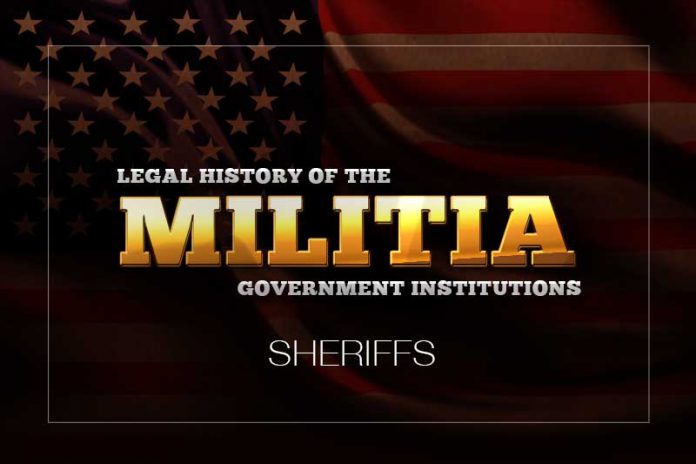Last Updated on August 20, 2022 by Constitutional Militia
Sheriff
Contrary to popular belief, no pre-constitutional American Militia were ever made generally subordinate to, or in any particulars controlled by or answerable to, Local Sheriffs as commanding officers. Moreover, in the plainest contradistinction to “the Militia of the several States”, Sheriffs derive no explicit authority whatsoever from the Constitution. In fact, the noun “Sheriff ” does not even appear in the Constitution.
Constitutional State Militia: Not Subordinate to Sheriffs
Contrary to another mistaken belief current among not a few contemporary patriots, Local Sheriffs enjoy no unique, supreme authority within their jurisdictions which would somehow entitle them either to assert direct control over whatever Militia units were already settled there, or indirectly to supersede and absorb the Militia entirely under their command by calling forth in the posse commitatus every adult eligible for the Militia.[1] Certainly no historical basis exists for any such claim. For no pre-constitutional American Militia were ever made generally subordinate to, or in any particulars controlled by or answerable to, Local Sheriffs as commanding officers.[2]
America’s Founding Fathers’ preeminent legal mentor was William Blackstone. And inasmuch as “[a]t the time of the adoption of the Federal Constitution [Sir William Blackstone’s Commentaries on the Laws of England] had been published about twenty years, and * * * more copies of the work had been sold in this country than in England; so that undoubtedly, the framers of the Constitution were familiar with it”,[3] and considered it “the preeminent authority on English law”,[4] every legally literate American was also aware of the general rule for statutory construction which Blackstone taught. As Blackstone described Sheriffs’ traditional powers under the law as applied in England,
“[A]S the keeper of the king’s peace, both by common law and special commission, he is the first man in the county, and superior in rank to any nobleman therein, during his office. He may apprehend, and commit to prison, all persons who break the peace or attempt to break it * * * . He may, and is bound ex officio to, pursue and take all traitors, murderers, felons, and other misdoers, and commit them to gaol for safe custody. He is also to defend his county against any of the king’s enemies when they come into the land: and for this purpose, as well as for keeping the peace and pursuing felons, he may command all the people of his county to attend him; which is called the posse commitatus, or power of the county: which summons every person above fifteen years old, and under the degree of a peer, is bound to attend upon warning, under pain of fine and imprisonment.”[5]
Blackstone’s reference to “common law” in the passage above is possibly the source of the composite proposal circulating among some contemporary patriots for the formation of “common-law militias” specifically commanded by Sheriffs.
The authority that many contemporary patriots want Sheriffs to exercise for the purpose of exposing and suppressing usurpation and tyranny, especially on the part of rogue officials of the General Government, ought to be exercised by someone. In fact, it can be exercised, with full constitutional sanction, by the Militia, with their commanders—at the National level, the President; at the State level, the Governor; and at the Local level, “the County Lieutenant” or other chief commanding officer in the jurisdiction—performing the functions that Sheriffs as such cannot perform.
Distinct from Sheriffs, the Militia are explicitly incorporated within the Constitution of the United States.[6] And the Constitution devotes more words to setting out Congress’s and the States’ powers with respect to the Militia than it does to setting out Congress’s powers with respect to the Army and the Navy, thereby attesting to the importance of the Militia within the federal system.





























